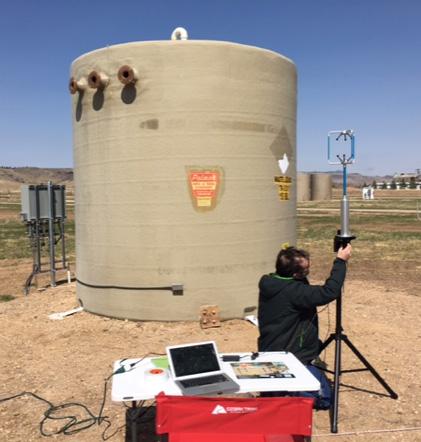ALFaLDS works on large oil& gas infrastructure, can help cut methane emissions by 90%

Credit: Los Alamos National Laboratory
LOS ALAMOS, N.M., October 28, 2020–A new study confirms the success of a natural-gas leak-detection tool pioneered by Los Alamos National Laboratory scientists that uses sensors and machine learning to locate leak points at oil and gas fields, promising new automatic, affordable sampling across vast natural gas infrastructure.
“Our automated leak location system finds gas leaks fast, including small ones from failing infrastructure, and lowers cost as current methods to fix gas leaks are labor intensive, expensive and slow,” said Manvendra Dubey, the lead Los Alamos National Laboratory scientist and coauthor of the new study. “Our sensors outperformed competing techniques in sensitivity to detecting methane and ethane. In addition, our neural network can be coupled to any sensor, which makes our tool very powerful and will enable market penetration.”
The Autonomous, Low-cost, Fast Leak Detection System (ALFaLDS) was developed to discover accidental releases of methane, a potent greenhouse gas, and won a 2019 R&D 100 award. ALFaLDS detects, locates and quantifies a natural gas leak based on real-time methane and ethane (in natural gas) and atmospheric wind measurements that are analyzed by a machine-learning code trained to locate leaks. The code is trained using Los Alamos National Laboratory’s high resolution plume dispersion models and the training is finessed on-site by controlled releases.
Test results using blind releases at an oil and gas well-pad facility at Colorado State University in Fort Collins, Colorado, demonstrated that the ALFaLDS locates the engineered methane leaks precisely and quantifies their size. This novel capability for locating leaks with high skill, speed and accuracy at lower cost promises new automatic, affordable sampling of fugitive gas leaks at well pads and oil and gas fields, the paper in the journal Atmospheric Environment: X concludes.
ALFaLDS’s success in locating and quantifying fugitive methane leaks at natural gas facilities could lead to a 90 percent reduction in methane emissions if implemented by the industry.
ALFaLDS used a small sensor, which makes it ideal for deployment on cars and drones. The Los Alamos team is developing the sensors that were integrated with a mini 3D sonic anemometer and the powerful machine-learning code in these studies.
However, the code is autonomous and can read data from any gas and wind sensors to help find leaks fast and minimize fugitive emissions from the vast network of natural gas extraction, production and consumption.
With this integration, ALFaLDS offers a revolutionary approach for oil and gas service providers in leak detection, to non-profit organizations surveying the issue, and to national laboratories and academia researching natural gas production.
###
Paper: “Neural networks to locate and quantify fugitive natural gas leaks for a MIR detection system,” Bryan Travis, Manvendra Dubey, and Jeremy Sauer, Atmospheric Environment: X, 2020, https:/
Funding: ALFaLDS was sponsored by the Department of Energy Advanced Research Projects Agency-Energy. Aeris Technologies and Rice University collaborated on the initial project that won the 2019 R&D 100 award from “R&D Magazine.”
About Los Alamos National Laboratory
Los Alamos National Laboratory, a multidisciplinary research institution engaged in strategic science on behalf of national security, is managed by Triad, a public service oriented, national security science organization equally owned by its three founding members: Battelle Memorial Institute (Battelle), the Texas A&M University System (TAMUS), and the Regents of the University of California (UC) for the Department of Energy’s National Nuclear Security Administration.
Los Alamos enhances national security by ensuring the safety and reliability of the U.S. nuclear stockpile, developing technologies to reduce threats from weapons of mass destruction, and solving problems related to energy, environment, infrastructure, health, and global security concerns.
LA-UR-20-28626
Media Contact
Charles Poling
[email protected]
Original Source
https:/
Related Journal Article
http://dx.




